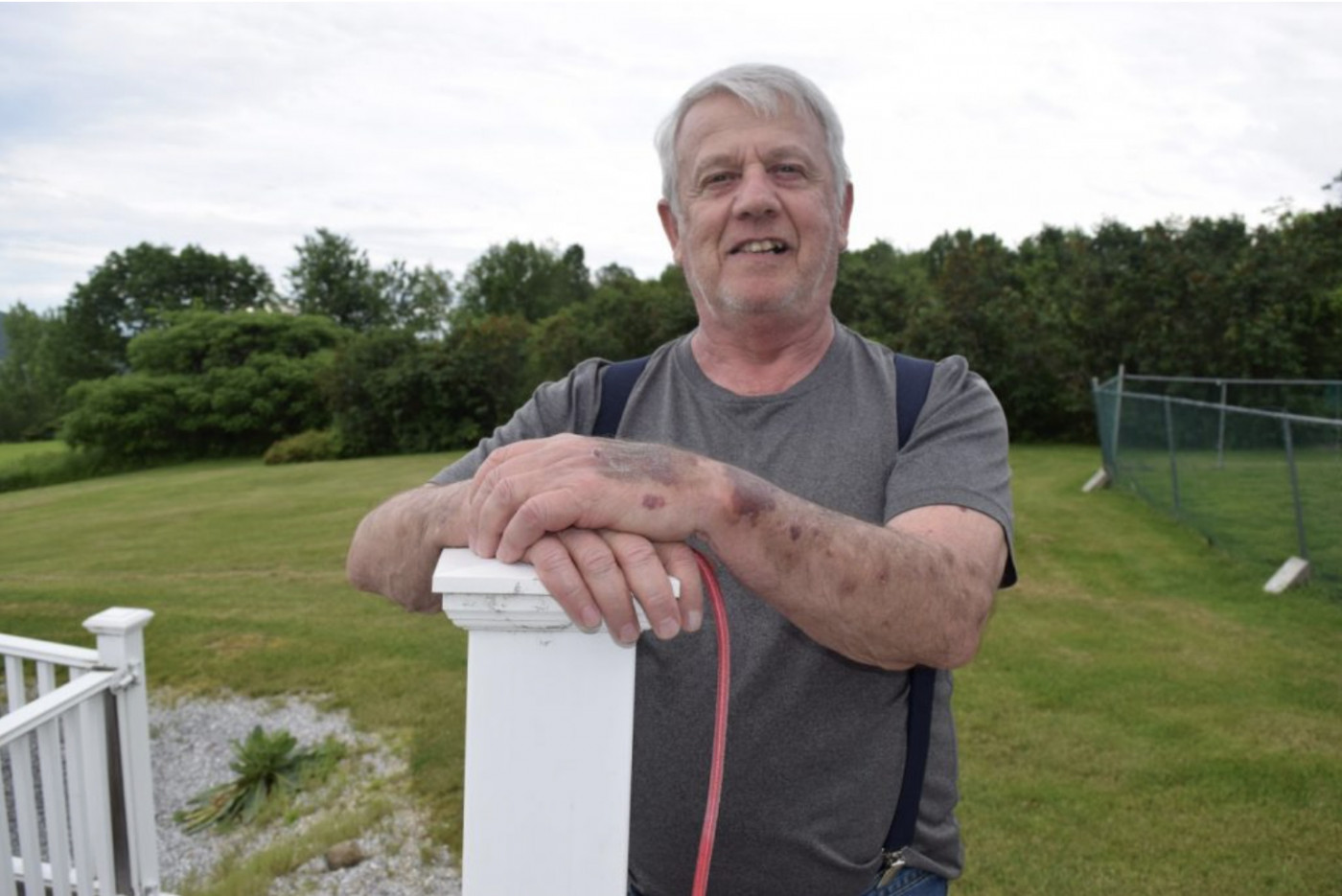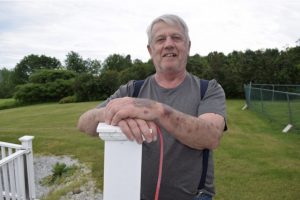Vermont Couple Shares Strategies on Managing Neurodegenerative Disease

Joe Lacroix, 67, outside his home in Milton, Vermont. (Photo by Helen Simon)
Like many couples, Joe and Linda Lacroix of Milton, Vermont, spent much of their lives working, raising families, maintaining their home, and planning for the future. Unlike most, however, there was always a dark cloud looming on their horizon — a gene for Huntington’s disease carried by Joe’s mother.
After Joe, 67, was diagnosed in 2002 at the age of 50, the couple’s life was turned upside down — physically, emotionally, and financially. They both had to retire early and simplify their lifestyle to cut expenses. They kept only one car. They switched to cheaper dog food.
At the age of 68, Linda was forced to return to work to make ends meet. Their son and daughter-in-law moved in with them, something unlikely to have happened had Joe not been sick.
In the ensuing 17 years, they’ve developed new routines to adjust to their changed circumstances. Here are some things that have helped Joe and Linda weather the ups and downs of living with Huntington’s — strategies that could easily apply to those struggling with amyotrophic lateral sclerosis (ALS), Alzheimer’s disease, Parkinson’s disease, and a range of other neurodegenerative disorders.
Accepting help
Joe spent most of his career working in a factory. He loved to ride his tractor and take care of his 10 acres in rural Vermont. But since Huntington’s took control of his body, he’s had to learn to let people help him with tasks he always did himself.
Help includes things like Linda voicing what he’s trying to say when his brain gets muddled and his mouth won’t shape the words. Things like waiting for his son to fix something he easily could have repaired in the past.
Not that it’s easy. “I get mad at myself because I know I should be able to do it, and at one time I did know how to do it,” Joe said. “That’s why I get into my mood swings.”
Help also includes having the couple’s son, Scott, and daughter-in-law, Angel, live with them so someone is always around to care for Joe. Scott works nights and stays home with Joe during the day; the women work during the day and are home at night. Scott does the household maintenance, and the women take turns cooking.
“By now, we’re a well-oiled machine,” Linda said.
Exercise and keeping busy
Although he can no longer make or fix things, Joe does what he can to help. He vacuums and dusts. He also cooperates when Linda forces him to keep moving despite the depression that saps his incentive.
“We went to see a psychiatrist, and she told me to make him do things,” Linda said. “She said, ‘He’s going to get mad at you, but make him do them anyway.’”
When she’s not working, Linda takes Joe for walks along their private road or woods. That improves his mood and helps manage his weight and heart problems.
“I’m just a bystander,” Joe said good-naturedly, “just trying to keep my body going straight and trying not to fall too many times.”
Although he hadn’t driven a vehicle for four years, Linda and Scott got him up on the tractor and drove him around.
Joe was initially very reluctant. But he admitted afterwards that it lifted his spirits “knowing that I accomplished something other than sitting around the house.”
Communication and support
Talking about everything and making joint decisions is something Linda and Joe have done ever since Joe was diagnosed, the couple said.
“We continually discuss things,” Linda said, noting that it’s critical for each of them to understand how the other feels. Some of the topics are so blunt that members of their Huntington’s support group are sometimes shocked, they said.
“I’ll say, ‘I lost my husband years ago,’” Linda said, “’and they’ll say, ‘Joe, how do you feel about that?’ and he’ll say, ‘I know,’ because I’ve told him that. I’m not saying it to be mean. I’m just trying to explain why I get so frustrated.”
Added Joe: “And I try to understand.”
Once a month for the past 18 years, Linda and Joe have attended a Huntington’s disease support group at an area hospital. As many as 20 people attend, include some who must drive long distances.
The couple said it’s helpful to be around empathetic people with similar experiences who face similar decisions. Professionals who provide information and an outside point of view also attend.
Trust and gratitude
Asked what he gives thanks for in his current condition, Joe said, “My caregiver.”
Answering the same question, Linda said, “I’m just grateful for every day I have.”
Joe said it’s hard to watch members of his support group deteriorate, losing the ability to talk and being forced to depend on wheelchairs and feeding tubes – sometimes contrary to their original wishes. He wants to chose how he lives the rest of his life, and to have those choices respected.
Joe has made clear to Linda that he doesn’t want a feeding tube when he can no longer swallow. He knows she will carry out his wishes.
“He trusts that I will do what he wants at the end,” Linda said. “We will do what he wants, not what I want.”







